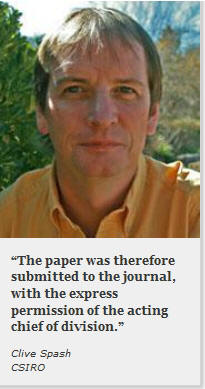|
|
|
|
|
|
|
News & Views item - November 2009 |
![]() CSIRO Administration to Allow Research on Emissions Trading to be Published With
"Minor but Important" Changes. (November 14, 2009)
CSIRO Administration to Allow Research on Emissions Trading to be Published With
"Minor but Important" Changes. (November 14, 2009)
 Articles
in today's Australian and NatureNews bring up to date the
events
surrounding the attempted publication by Clive Spash of his paper
"The Brave New World of Carbon Trading" in the British journal New Political
Economy, which is critical of cap-and-trade systems for controlling carbon
emissions.
Articles
in today's Australian and NatureNews bring up to date the
events
surrounding the attempted publication by Clive Spash of his paper
"The Brave New World of Carbon Trading" in the British journal New Political
Economy, which is critical of cap-and-trade systems for controlling carbon
emissions.
Dr Spash told The Australian's Nicola Berkovic that when he submitted his paper for peer review, he did so with the support of management. Then, after the paper was accepted for publication, he was informed that any critique of emissions trading schemes breached the new CSIRO charter, which prevents scientists from debating the merits of government policy.
In ANU Professor John Dryzek's view the paper is "a scholarly piece, otherwise it wouldn't have been accepted by the journal." Professor Dryzek is a memeber of the journal's editorial board.
Nevertheless Dr Spash told Ms Berkovic that "the pressure from management to accept its decision [to have the paper withdrawn] was immense. After several visits from senior managers, his junior co-author decided to pull his name from the paper and Spash says he too was heavied. Within 24 hours of the CSIRO's decision to block publication in his private capacity, he received a letter that listed trivial instances in which he had breached CSIRO policy, such as an alleged failure to fill out a leave form months earlier".
Dr Spash told NatureNews that he and CSIRO Chief Executive Megan Clark : "had a productive talk. I was told by the chief executive that her changes would be tiny, consisting of a few words or phrases. That sounds as if it would be acceptable." On the other hand CSIRO's manager for media liaison, Huw Morgan, while confirming that Dr Clark told Spash the article was publishable under CSIRO rules he said it would require "minor but important" changes.
Dr Spash told Nature that Dr Clark agreed with "my own opinion that the paper did not breach the CSIRO charter or policy in any substantive fashion. This reversed the decision statements previously issued to me by senior managers wishing to cut 75% or more of the paper." This was despite that it had been "submitted to the journal, with the express permission of the acting chief of division, prior to completion of the internal referee's reports. [However,] both internal referees recommended publication a few weeks after submission to the journal."
In Dr Spash's view: "The CSIRO is facing a point where the science-policy interface is changing and (it has) to decide how to handle that. We're moving out of the area of experimental science and objectivity . . . to debates about values and the types of technology we use, the types of data we put forward. Climate change is an example of where policy and science are interacting."
It has now become public knowledge that in October CSIRO has been developing a revised publications policy. In essence it will disallow the organisation's researchers from being able to say that the opinions they express are their own and not necessarily those of the organisation.
Former CSIRO climate science chief Graeme Pearman told Ms Berkovic: "If a government is so sensitive that they can't deal with that diversity [of opinion], then there's something wrong."
According to NatureNews: "Spash hopes his case will highlight the need for openness and public engagement. 'This does not mean scientists becoming political activists or advocates,' he says. 'It does mean being prepared to make and defend logical arguments and being prepared to explore moral and ethical issues. Institutions are today facing the reality of a new mode of operation at the science–policy interface,' he adds. 'My hope is that recent events have shown they must grasp this challenge rather than falling back into a mode of operation which is long outdated.'"